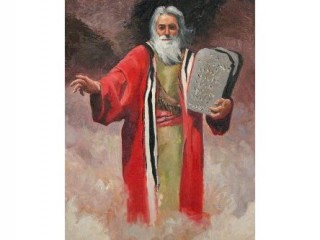
Moses biography
Date of birth : -
Date of death : -
Birthplace : Goshen, Lower Egypt
Nationality : Hebrew
Category : Historian personalities
Last modified : 2011-11-25
Credited as : prophet, emancipator of Israel, Old Testament
The Old Testament prophet Moses (ca. 1392-ca. 1272 B.C.) was the emancipator of Israel. He created Israel's nationhood and founded its religion.
Moses was the son of Amram and Yochebed of the tribe of Levi. He was born in Egypt during the period in which the Pharaoh had ordered that all newborn male Hebrew children be cast into the Nile. Rescued by the daughter of the Pharaoh, he was brought up in the splendor of the Egyptian court as her adopted son. Grown to manhood, aware of his Hebraic origin, and with deep compassion for his enslaved brethren, he became enraged while witnessing an Egyptian taskmaster brutally beating a Hebrew slave. Impulsively he killed the Egyptian. Fearing the Pharaoh's wrath and punishment, he fled into the desert of Midian, becoming a shepherd for Jethro, a Midianite priest whose daughter Zipporah he later married. While tending the flocks on Mt. Horeb far in the wilderness, he beheld a bush burning that was not consumed. In the revelation that followed, he was informed that he had been chosen to serve as the liberator of the children of Israel. He was also told to proclaim the unity of God to his entire people, which doctrine heretofore had been known only to certain individuals.
The tremendous responsibility of his task, his innate humility, and his own feeling of unworthiness evoked a hesitancy and lack of confidence in Moses. He was assured, however, that Aaron, his more fluent brother, would serve as his spokesman both to the children of Israel and to the Pharaoh.
Moses returned to Egypt and persuaded the Hebrews to organize for a hasty departure from the land of bondage. Together with Aaron, he informed the Pharaoh that the God of the Hebrews demanded that he free His people. The Pharaoh refused to obey, bringing upon himself and his people nine terrible plagues that Moses wrought upon Egypt by using the miraculous staff he had received as a sign of his authority. The tenth plague, the killing of the firstborn sons of the Egyptians, broke the Pharaoh's resistance and compelled him to grant the Hebrews permission to depart immediately. Moses thus found himself the leader of an undisciplined collection of slaves, Hebrew as well as non-Hebrew, escaping from Egyptian territory to freedom.
Moses' immediate goal was Mt. Horeb, called Mt. Sinai, where God had first revealed Himself to him. The Hebrews came to the sacred mountain fired by the inspiration of their prophetic leader. Summoned by God, Moses ascended the mountain and received the tablets of stone while the children of Israel heard the thundering forth of the Ten Commandments. Inspired, the people agreed to the conditions of the Covenant.
Through 40 years in the wilderness of Sinai, overcoming tremendous obstacles, Moses led the horde of former slaves, shaping them into a nation. He selected and set them apart for a divine purpose and consecrated them to the highest ethical and moral laws. Only a man with tremendous will, patience, compassion, humility, and great faith could have forged the bickering and scheming factions who constantly challenged his wisdom and authority into an entity.
Moses supplemented the Ten Commandments by a code of law regulating the social and religious life of the people. This collection of instructions, read to and ratified by the people, was called the Book of the Covenant.
Under his leadership, most of the land east of the Jordan was conquered and given to the tribes of Reuben and Gad and to half of the tribe of Menashe. Moses, however, was not permitted to lead the children of Israel into Canaan, the Promised Land, because he had been disobedient to God during the period of wandering in the desert. When the people were in need of water, God told Moses to speak to a rock and water would spring from it. Instead he had struck the rock with his staff. From the heights of Nebo he surveyed the land promised to his forefathers, which would be given to their children. Moses, 120 years old, died in the land of Moab and was buried opposite Bet Peor.
















